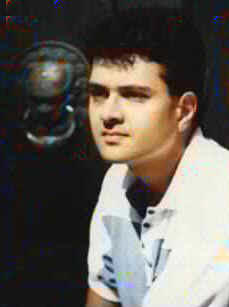Keep church and state separate!
This was a point I made on the Democrats-For-Life e-mail list in 2000. I
said when it comes to talk about abortion, let's "keep it secular."
Louis Shapiro (Shapiro is a Jewish name, but he's Catholic), a former
Republican, disagreed.
He said he and other Christian conservatives don't want to impose their
religion on others, but do want religion in the public square.
He complained that because of radical secularism, "...we can't even mention
God at a football game."
My friend Greg, raised Catholic, and who first got me interested in religion
and politics, reacted by asking in a phone conversation: what would a
religious person be doing at a football game in the first place?
I agreed with Greg: wouldn't a religious person be leading a sheltered or
cloistered life at temple, monastery, or nunnery? Or off somewhere
meditating in the Himalayan mountains?
What would a religious person be doing at a sporting event, an event which
serves no higher purpose, only sense gratification?
Dr. Larry Shinn observes:
"...there is a similarity in the Krishna and the Catholic traditions in
their stress on formal rituals, the abundant use of iconography, their
hierarchical institutional/authority structure, their strong emphasis on the
private prayerlife, and their ideals of the monastic life of full time
religious service and personal piety."
Ironically, when complaining about not being able to mention God at a
football game, Louis Shapiro was referring to a lawsuit which was brought by
Mormons and Catholics in 2000 against Protestant bias in prayers being
recited before football games.
This kind of bias has happened before. In his 2003 book, Why the Religious
Right is Wrong About Separation of Church and State, journalist Rob Boston
writes:
"Catholics did not start arriving on American shores in significant numbers
until the late 1830s and 1840s and with the great waves of immigration in
the post-Civil War era and early twentieth century.
"The small numbers of Catholics who did choose to live in America could find
life difficult. Guaranteed the right to worship by the Constitution, they no
longer had to worry about their priests being shackled and thrown into
prison or their churches being raided by agents of the state.
"However, many overt forms of prejudice still existed, especially in
employment. But the one area where Catholics encountered the greatest
frustration was in the public school system...
"Catholic children were not simply required to sit through religious
exercises alien to them; they were often forced to take an active role in
them.
"Great insensitivity reigned in some parts of the country as the Protestant
majority laid down the rules for religious exercises in public schools...
"Things quickly got ugly. Even though the Catholic parents were not
requesting that the religious practices be terminated--merely that their
children not be required to sit through them--violence erupted...
"During a similar flap over religious exercises in Philadelphia's public
schools in 1844...a riot broke out in that city that lasted three days.
Violence erupted after the city's Board of Education voted to allow Catholic
children to be excused from mandatory religious exercises or use their own
version of the Bible.
"Again, all the Catholics were asking for was that their beliefs be
respected, not that the Protestant practices be stopped entirely.
"Catholic churches and the homes of Catholic parents were burned; thirteen
people were killed.
"In later years violence on a smaller scale broke out in other areas. In
1854 in Ellsworth, Maine, an outraged mob tarred and feathered a missionary
priest, John Bapst, after he urged a parishioner to go to court and fight a
school board regulation requiring children to read the King James Bible.
"Abuses such as these led to the creation of the Catholic school system in
America. Fed up with the overt Protestant flavor of the public schools and
desiring a system that would inculcate their own values, American Catholics
created one.
"Early conflicts over religion in public schools led to court battles in
several states. In many cases, the actions were filed by disgruntled
Catholic parents--sometimes backed by Jews--who desired a secular
educational system.
"In light of this history, it is remarkable that today some conservative
Catholics have joined the movement for a school prayer amendment. How easily
some forget their own history!"
Go on to: Kill the Poor?
Return to: Articles


